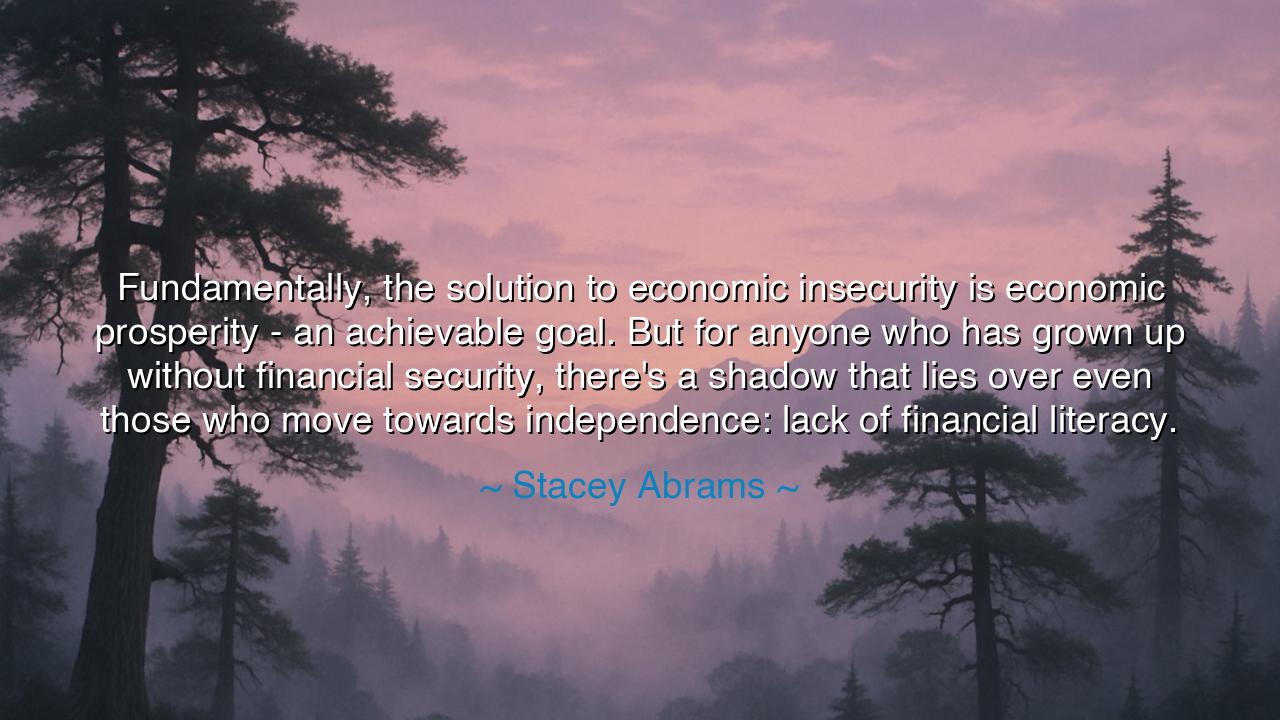
Fundamentally, the solution to economic insecurity is economic
Fundamentally, the solution to economic insecurity is economic prosperity - an achievable goal. But for anyone who has grown up without financial security, there's a shadow that lies over even those who move towards independence: lack of financial literacy.






The words of Stacey Abrams echo with both truth and tenderness, for they come from one who has walked the road of struggle and seen the hidden snares of success. “Fundamentally, the solution to economic insecurity is economic prosperity — an achievable goal. But for anyone who has grown up without financial security, there’s a shadow that lies over even those who move towards independence: lack of financial literacy.” In this reflection, Abrams speaks not only of wealth and poverty, but of the deeper chain that binds the human spirit — ignorance of how to command one’s own resources. It is a wisdom older than commerce itself: that prosperity without understanding is like a river without banks — powerful, but prone to flood and destroy.
In the modern world, where money moves faster than thought and fortunes rise and fall like tides, economic insecurity is not born solely from scarcity, but from confusion. Those who grow up amidst uncertainty learn to fear both excess and lack; they carry within them the echo of instability. Abrams reveals a truth often hidden beneath the glitter of opportunity — that to be free, one must first understand the tools of freedom. Financial literacy is not a luxury of the privileged; it is the armor of the independent. Without it, even prosperity becomes fragile, and independence becomes illusion.
History is filled with those who gained riches yet lost everything for want of knowledge. Consider the parable of the lottery winner — an ordinary soul who rises overnight to wealth yet finds themselves destitute again within years. Why? Because their mind had not been trained to command abundance. They possessed gold but not guidance, assets but not awareness. Or think of ancient Rome, where citizens once traded virtue for luxury, until corruption devoured the empire from within. True prosperity must rest on wisdom, not merely accumulation. Abrams reminds us that it is not enough to seek economic prosperity — we must also cultivate economic understanding.
And what is this understanding? It is not only the knowledge of numbers or markets, but the discipline of foresight — the sacred art of stewardship. It is knowing how to save without fear, how to spend with purpose, and how to invest with integrity. For as the ancients said, “A wise man’s wealth is in his knowledge.” In a time when many labor day and night, yet remain trapped in debt and doubt, Abrams’s words are a call to awaken — to learn the language of finance, that we may no longer be slaves to systems we do not comprehend.
Let us recall the story of Booker T. Washington, born into slavery yet rising to become a founder of schools and movements. He taught that education was the key not only to freedom but to stability — that a people freed by law must also be freed by knowledge. He built institutions where men and women learned not just to read words, but to read the world. So too must we, in our age, build a culture that values financial education as much as moral or civic virtue. For only then can prosperity endure beyond a single generation.
Abrams’s insight carries a deeper emotional truth as well — the shadow of insecurity that follows those who were raised in scarcity. Even when success comes, fear whispers that it may not last. The child who once saw bills unpaid or cupboards empty carries that memory like a scar. To overcome it requires not only earning power but emotional literacy — the courage to trust one’s stability, to make decisions not from panic, but from purpose. This is why education alone is not enough; what is needed is empowerment, a rebuilding of one’s inner relationship with abundance.
So, let this be the teaching drawn from Abrams’s wisdom: prosperity is not the absence of poverty, but the presence of understanding. To build wealth without wisdom is to build towers upon sand. Each person must become a student of their own future — learning how to save, plan, and protect, not just for themselves but for their communities. For when a people understand money, they master it; when they do not, it masters them. Knowledge, not luck, is the true inheritance of the free.
And finally, to those who walk this path, remember: prosperity is not a prize to be won, but a skill to be learned. Study it as you would study virtue. Teach it as you would teach honor. Share it as you would share light. For when financial literacy spreads through a nation, the shadow of insecurity fades, and a brighter future rises — not built by the rich for the few, but built by the wise for all.






AAdministratorAdministrator
Welcome, honored guests. Please leave a comment, we will respond soon